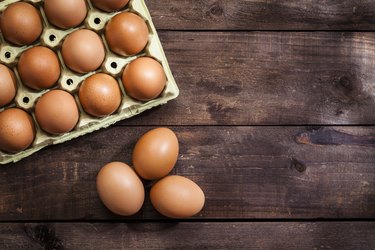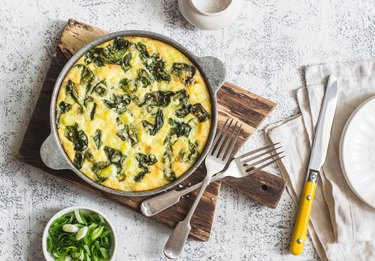
The incredible, edible egg. Nutritious? Yes. Versatile? You bet. Your best bet for weight loss? Well, maybe — but maybe not.
In a nutshell (or, we suppose, an eggshell), the egg diet is a fad-like approach to losing weight that has both pros and cons. Here, we'll look at what you can eat on the egg diet (how many eggs can you eat a day, anyway?), whether the diet is safe and if it can actually help you lose weight and keep it off.
Video of the Day
Video of the Day
What Is the Egg Diet?
The egg diet, sometimes referred to as the boiled egg diet, is a protein-rich, low-carbohydrate diet designed to provide adequate protein for muscle building and maintenance while promoting weight loss.
According to the North Carolina Egg Association (NCEA), the egg diet sticks to lean sources of protein while focusing on cutting calories. The diet is typically followed for at least 14 days, but some people follow the plan longer based on their weight-loss goals.
What Can You Eat on the Egg Diet?
While there are different variations of the egg diet, and the exact food rules may vary, a popular approach breaks down like this:
Foods Included:
- Eggs
- Chicken
- Turkey
- Fish
- Low-carbohydrate fruits and vegetables like broccoli, cauliflower, mushrooms. carrots, apples, greens and citrus fruits
- Non-caloric beverages, including unsweetened tea, coffee and water
Foods Excluded:
- Potatoes
- White rice
- Pasta
- White bread
- Calorie-containing beverages, including alcohol, soda, fruit juice and other sweetened drinks
- Processed or pre-packaged foods
Read more: How Many Eggs Should You Eat a Day to Lose Weight?
Sample Egg Diet Plan
Again, there are many variations of the egg diet out there. But the NCEA provides the following sample meal plan for the egg diet:
Breakfast
- Two eggs cooked as you like
- One piece of fresh fruit
- One slice of whole-grain toast with 1 tablespoon butter
- 8 ounces of water to drink
Lunch
- 4-ounce serving of lean protein (chicken, turkey or fish)
- One cup steamed veggies (broccoli, carrots or other low-starch vegetable)
- 1/2 cup steamed brown rice
- 8 ounces of water to drink
Dinner
- One whole-grain tortilla filled with 2 ounces of cooked lean ground turkey, 1/4 cup of black beans and as many steamed onions and peppers as you'd like
- One fresh fruit cup
- 8 ounces of your drink of choice that's less than 200 calories (preferably calorie-free if possible)
Can You Lose Weight by Only Eating Eggs?
Other versions of the egg diet encourage eating only eggs to lose weight. This is an unsafe approach to weight loss that can put you at risk for nutritional deficiencies and other health problems.
How Much Weight Can You Lose on the Egg Diet?
While the egg diet may have recently become popular for weight loss, it does not contain a magical mix of nutrients that help burn off extra pounds. There are no available research studies showing the benefits of the egg diet on long-term weight loss.
The diet is more likely to work in the short-term because it falls into the category of a fad diet, per the Academy of Nutrition and Dietetics, meaning that it reduces your overall calories by severely limiting the foods you're allowed to eat. NCEA does not designate a specific calorie amount allowed, but if a person were to follow the sample meal plan above, it would limit calories to about 1,000 calories per day, which is extremely low.
Is the Egg Diet Safe?
The egg diet is potentially unsafe because it cuts calories too low. Experts recommend that calorie intake not fall below 1,200 a day for women or 1,500 a day for men unless you are on a medically supervised plan provided by a health care provider, per Harvard Health Publishing. Limiting calories too much can cause you to be deprived of the nutrients needed for normal bodily functions.
In order to lose weight, you need to take in fewer calories than your body burns, creating a negative calorie balance. According to Harvard Health Publishing, to lose 1 to 2 pounds a week — a rate that experts consider safe — you should consume 500 to 1,000 calories less than your total weight-maintenance calories.
To estimate your body's daily calorie needs, Harvard Health Publishing recommends taking your current weight in pounds and multiplying by 15. You may also choose to track your daily calorie intake and weight over a few days using an app like LIVESTRONG.com's MyPlate.

Why Long-Term Weight Loss Matters More
While the egg diet may result in quick weight loss, you may have a difficult time keeping the weight off for a few reasons. First, most of the weight you lose initially following the egg diet is water, not fat.Once you begin eating normally again, your body will restore its water supplies, and the scale will move back up.
Also, because of the severe restriction in calories, your body may be burning muscle for fuel instead of your fat stores. This can be dangerous and also sabotage your weight-loss aim, since muscle loss may result in fatigue and decrease your overall metabolic rate.
Finally, the egg diet for weight loss isn't a long-term plan. The diet doesn't teach you how to eat to maintain your weight loss. And because it's so restrictive, you may find it harder to control yourself once you go "off" the diet.
"High-carbohydrate foods are visible and easy to remove from a plate regardless of preparation method, thus making a low-carb diet attractive to dieters in the short-term," Robert Santana, RD, dietitian and owner of Weights & Plates Strength and Nutrition Center, tells LIVESTRONG. "In the long-term, most restrictive diets ultimately fail."
Read more: Can You Lose Weight by Eating Six Boiled Eggs a Day?
What About the Keto Egg Fast?
An egg fast is different from the boiled egg diet. It is a short-term version of the keto diet that includes eating whole eggs and sources of fat like butter and cheese. The egg fast is meant to be followed for a few days to spur quick weight loss, which means it also falls in the category of an unhealthy and potentially unsafe fad diet.
The Best Strategy for Long-Term Weight Loss
The best way to lose weight and keep it off is to find a meal plan that you can follow with the nuances of everyday life — one that includes a variety of foods that you enjoy eating from all the food groups and helps you lose weight at a healthy rate of 1 to 2 pounds a week.
This nutrition plan should also include enough calories and carbs to support energy, so you can exercise. Making exercise part of your weight-loss program helps you lose weight and keep it off, according to a paper in the January-February 2014 issue of Progress in Cardiovascular Diseases. You don't need to run a marathon to get the benefits, but a brisk 30- to 60-minute walk most days of the week can help you reach your goals.
Read more: How to Find the Best Weight-Loss Diet for You
Adding Eggs to Your Weight-Loss Plan
While sticking to the restrictive egg diet may not be the best choice, there are many ways to incorporate eggs into a healthy eating plan.
- Make a Mushroom and Tomato Omelet for breakfast.
- Serve your poached eggs over a sweet potato hash.
- Keep hard-boiled eggs in your fridge for an on-the-go snack to take to work.
- Chop hard-cooked eggs and add to your salad greens for a protein boost.
- Add sliced hard-boiled eggs to your avocado toast.
- Bake an Easy Caprese Frittata.
If you want to save a few calories and omit the fat and cholesterol, just use the egg white instead of the whole egg. The egg white from one large egg has:
- 17 calories
- 4 grams of protein
- No fat or cholesterol
You can use the egg whites as you would the whole egg: to make omelets, boost protein in your greens or make a frittata.
Egg Nutrition
Eggs are an excellent source of protein, a slew of B vitamins and selenium.
One large, hard-cooked egg (about 50 grams) contains:
- 80 calories
- 0 grams of carbs
- 5 grams of total fat
- 6 grams of protein
- 1.6 grams of saturated fat
- 187 milligrams of cholesterol
- 28 percent of the daily value (DV) for selenium
- 8 percent of the DV for vitamin A
- 23 percent of the DV for vitamin B12
- 27 percent of the DV for choline
- 6 percent of the DV for vitamin D
If you're worried about the cholesterol in eggs and how that might affect your heart health, just make sure to limit your consumption. A meta-analysis of over 175,000 people, published January 2020 in The American Journal of Clinical Nutrition, found that eating one egg per day isn't associated with a higher risk of death or heart disease.
Warning
If you have high cholesterol or heart disease, or if you have to follow a diet to manage a specific health condition, talk to your doctor about how eggs can fit into your eating plan.
- North Carolina Egg Association : "The boiled egg diet"
- Harvard Health Publishing: "Calorie counting made easy"
- The Academy of Nutrition and Dietetics: "Staying Away from Fad Diets"
- Progressive in Cardiovascular Diseases: "The Role of Exercise and Physical Activity in Weight Loss and Maintenance"
- USDA: "Nutrition Comparison of Egg Whites (Raw) vs Hard Boiled Egg"
- The American Journal of Clinical Nutrition: "Association of egg intake with blood lipids, cardiovascular disease, and mortality in 177,000 people in 50 countries"